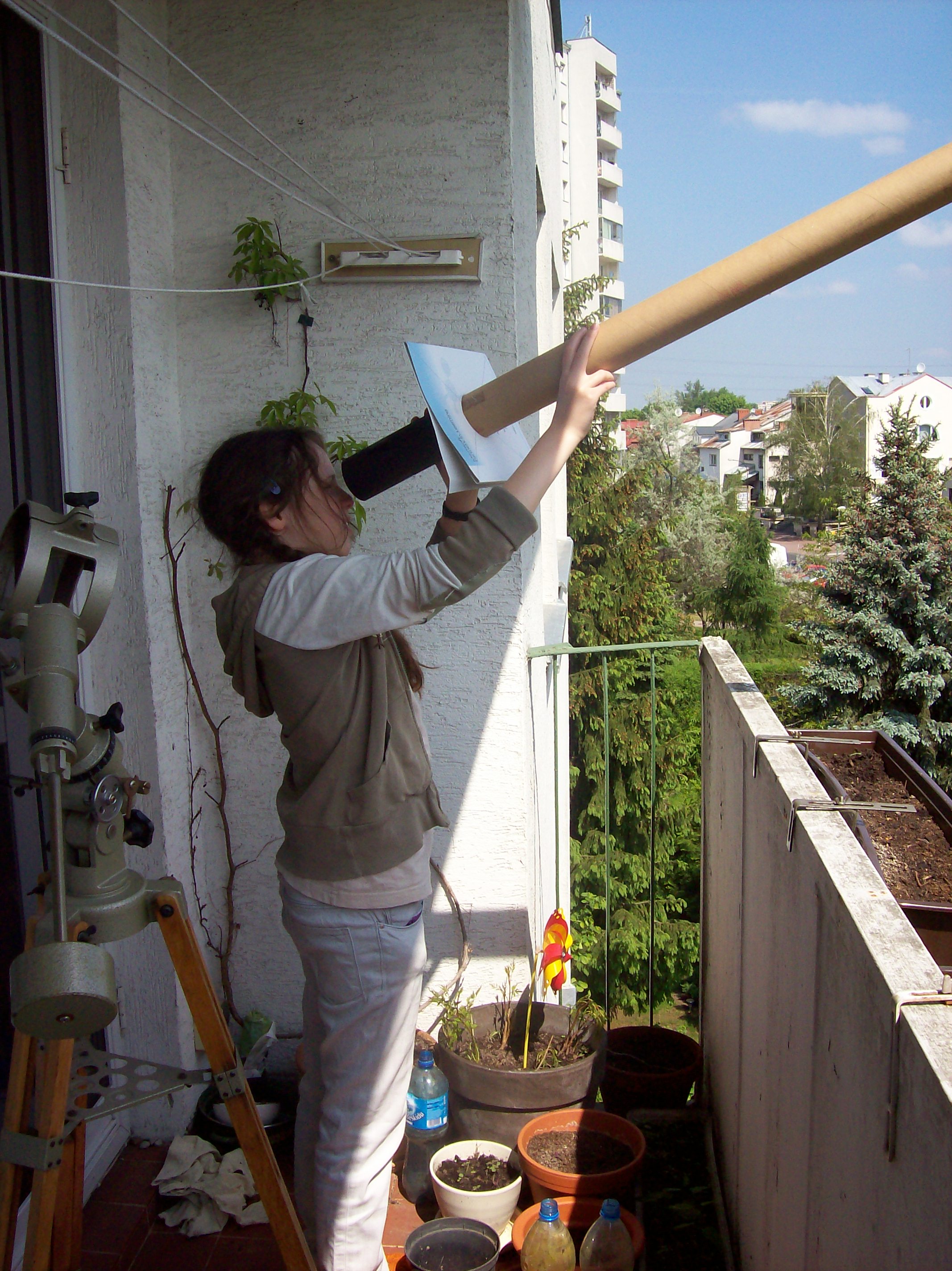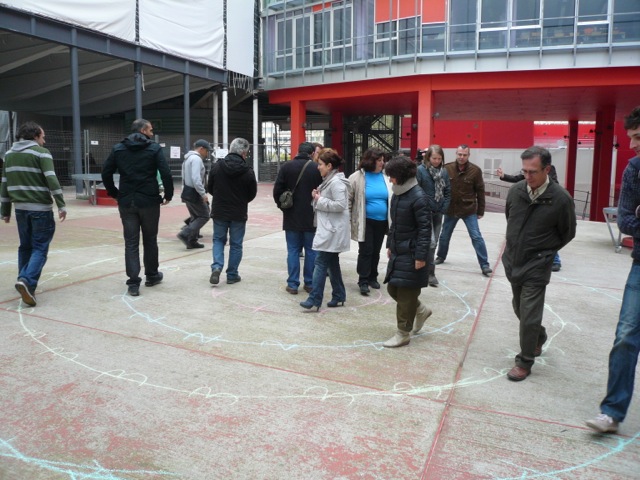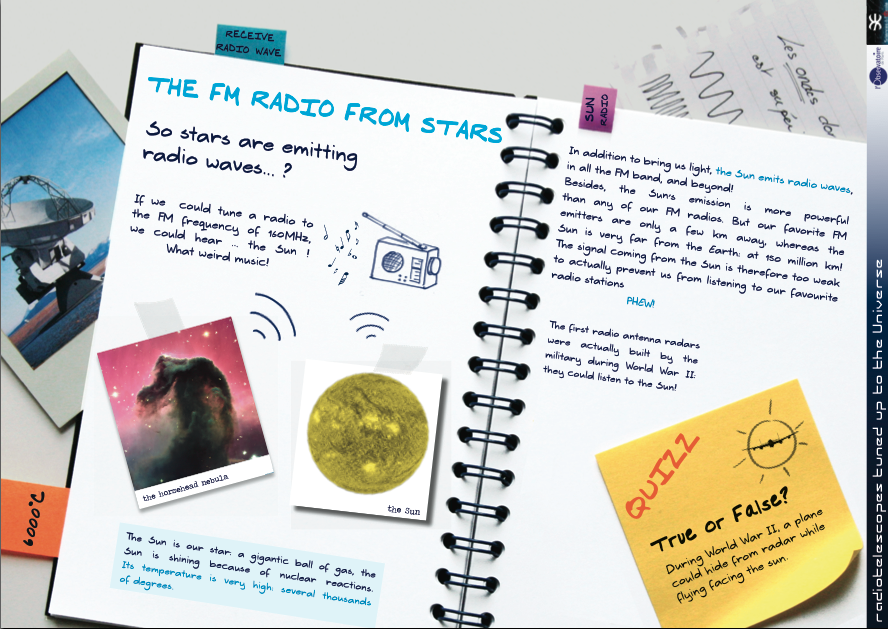News
TAD: the first GLORIA solar telescope
The TAD (Generally Available Telescope - TelescopioAbiertoDivulgación) located in Tenerife allows solar photosphere observations.
It is a robotic telescope and every Internet users may gain access to the telescope by creating their account on the GLORIA project website!

Each observation session (or "experiment") lasts 15 minutes and the users can make observations between 15.00 and 19.00 UT.
>>Here<< is a manual to use this telescope.
Use this link to sign in and begin to use this wonderfull tool!
Enjoy!
Dead-line for EU-HOU 2014 training sessions: 17th September 2013
There is a new dead-line through the national Comenius agencies for application to EU-HOU training sessions and seminars. We organise two 5-days training sessions entitled EUHOU: Hands-On Universe, Europe. Bringing frontline interactive astronomy in the classroom due to be hold 26th March 2014 till 1st April 2014 (and 23-27 June 2014) in Paris. It is currently renewed in the European catalogue.
If you are a teacher from the EU, you can apply for funding from your Comenius National Agency to attend these courses/seminars. The funding should (in principle) cover everything - course cost, accommodation, subsistence and travel.
Please note that our Life Long Learning Service will be closed in August 2013, so do not hesitate to contact us as soon as possible if you are interested. Contact: training@euhou.net
You can register now, the deadline is 17th September 2013 !
The main goal of these training sessions and seminar are to re-awake the interest for science in the young generation with inquiry-based methods. Renewing of the teaching of science is fulfilled through astronomy as a well-established source of motivation, and through the use of new Information and Communication Technologies - ICT. Involving teachers in a variety of research-based astronomical projects, we will excite, enthuse and motivate them to teach science/technology/maths. The training is intended to enhance basic competencies of teachers and develop higher level skills and expertise, primarily in ICT, maths and physics area. The EU-HOU project will provide the opportunity for trained teachers to get involved in stimulating international collaborations and to enthuse their pupils to study sciences/technology/maths at a higher level.
Dead-line for EU-HOU May 2013 training sessions: 16th January 2013
There is a new dead-line through the national Comenius agencies for application to EU-HOU training sessions and seminars. We organise two 5-days training sessions entitled EUHOU: Hands-On Universe, Europe. Bringing frontline interactive astronomy in the classroom (FR-2013-408-003) due to be hold 27-31 May 2013 in Paris.
If you are a teacher from the EU, you can apply for funding from your Comenius National Agency to attend these courses/seminars. The funding should (in principle) cover everything - course cost, accommodation, subsistence and travel.
You can register now, the deadline is 16th January 2013 !
This same deadline also applies for submitting application to National Agencies in order to attend the summer school organized in the framework of the Discover the Cosmos project, to be held in Volos, Greece, from July 30th to August 4th, 2013.
All information at the summer school's website: http://dtc.ea.gr
To get a larger map.
The main goal of these training sessions and seminar are to re-awake the interest for science in the young generation with inquiry-based methods. Renewing of the teaching of science is fulfilled through astronomy as a well-established source of motivation, and through the use of new Information and Communication Technologies - ICT. Involving teachers in a variety of research-based astronomical projects, we will excite, enthuse and motivate them to teach science/technology/maths. The training is intended to enhance basic competencies of teachers and develop higher level skills and expertise, primarily in ICT, maths and physics area. The EU-HOU project will provide the opportunity for trained teachers to get involved in stimulating international collaborations and to enthuse their pupils to study sciences/technology/maths at a higher level.
Venus transit in Paris, during a EU-HOU training session
During the European Comenius training session for teachers at Univ. Pierre & Marie Curie in Paris (4-8th June 2012), a group of motivated teachers and trainers went observing the transit of Venus at the top floor (24th floor) of the Zamansky tower, in the Jussieu campus. Unfortunately, the weather was not good enough to see the Sun. Nevertheless, watching the Sun rising over Paris was a beautiful moment, and we did have a great time :)
The transit of Venus is the passage of Venus across the Solar disc. It was expected in Paris between 5:50 (hours of sunrise in local time) and 6:40 (time of last contact). To be observable from Earth, the Sun, Venus and Earth should be in a particular configuration, which happens very rarely on the scale of a human life. Indeed, the next transit will not occur again before December 11, 2117.

The team included representatives of France, Italy, Portugal and UK!
Read more: Venus transit in Paris, during a EU-HOU training session
Handy Pinhole Camera to observe the transit of Venus
 |
 |
|
 |
Lech Mankiewicz
Paweł Rudawy
Astronomical Institute, University of Wroclaw, Poland
Handy Pinhole Camera (Latin Camera Obscura)
to observe the transit of Venus, eclipses and other phenomena
occurring on the Sun
The sun, our nearest star,
occasionally allows us to observe spectacular astronomical phenomena: eclipses,
appearances of large sunspots and solar flair fields, or passing of the inner
planets (Venus and Mercury) between the Sun and Earth. In the morning of June
6, 2012 we will be able to observe the passage of Venus against the solar disk.
Transits of Venus are quite rare (we will have to wait for the next one until
2117) so it is not surprising that the forthcoming event is of great interest.
Unfortunately, observations of the Sun are neither easy nor
safe. The Sun must not be viewed with the naked eye, and under no circumstances
can you look at it through binoculars or a telescope without a proper filter
unless you want to go instantly and permanently blind!

Some shops offer special eclipse glasses, however, due to the minimal diameter of the visible Venus (less than 1 ") they are not very useful for observing planet transits. Therefore, for those who would like to observe the transit of Venus with their own observation instrument - we prepared a description of a simple pinhole camera (ie from Lat. Camera Obscura) for the observations of various phenomena occurring on the Sun.
| Pinhole Camera to observe the transit of Venus |
Kinesthetic activity on the modelling of the Milky Way
During the last EU-HOU training session (2-6 April 2012), which has gathered in Paris 13 teachers from 7 different countries through the Comenius national agency life long learning program, Alexander Rudolph (Cal Poly Pomona, USA, on sabbatical at UPMC, France) has presented a successful kinesthetic activity. Here are some snapshots illustrating the main aspects of this activity. This was intended to illustrate the current development of the EUHOU-MW small radiotelescope network for schools: it enables to study the hydrogen gas of our Galaxy the Milky Way. Observations performed through a Web interface enable learners to detect gas velocities, as shown in this kinesthetic modelling.
(1) Solid-body and differential rotations

Read more: Kinesthetic activity on the modelling of the Milky Way
Dead-line for EU-HOU training sessions: 30 April 2012
There is a new dead-line through the national Comenius agencies for application to EU-HOU training sessions and seminars. We organise two 5-days training sessions entitled EUHOU: Hands-On Universe, Europe. Bringing frontline interactive astronomy in the classroom (FR-2011-359-006) due to be hold 15-19 October 2012 in Athens and 12-16 December 2012 in Paris. We also offer a 2-days seminar entitled EU-HOU - Connecting classrooms to the Milky Way (FR-2012-360-002), based on our remotely controled radiotelescope network, on 22-23 November 2012 in Coimbra (Portugal).
If you are a teacher from the EU, you can apply for funding from your Comenius National Agency to attend these courses/seminars. The funding should (in principle) cover everything - course cost, accommodation, subsistence and travel.
You can register now, the deadline is 30th April 2012!
To get a larger map.
The main goal of these training sessions and seminar are to re-awake the interest for science in the young generation with inquiry-based methods. Renewing of the teaching of science is fulfilled through astronomy as a well-established source of motivation, and through the use of new Information and Communication Technologies - ICT. Involving teachers in a variety of research-based astronomical projects, we will excite, enthuse and motivate them to teach science/technology/maths. The training is intended to enhance basic competencies of teachers and develop higher level skills and expertise, primarily in ICT, maths and physics area. The EU-HOU project will provide the opportunity for trained teachers to get involved in stimulating international collaborations and to enthuse their pupils to study sciences/technology/maths at a higher level.
The FM Radio from stars: an A4 exhibition on Radio Astronomy
Want to know more about radio astronomy? Click on this link to download our exhibition in A4 format, easily printable and usable for classrooms activities. In this document, you will learn a lot about how radio waves can contribute to unravel the mysteries of the Universe. You will also learn the difference about radio waves and sound waves, and compare the radio emission from a star to the strength of a mobile phone signal. This work was done by the EU-HOU members, in collaboration with Science à l'école, a project from the French ministry, and Paris Observatory.


 Pinhole camera to observe the transit of Venus
Pinhole camera to observe the transit of Venus